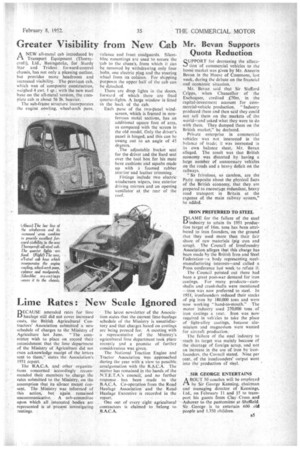Mr. Bevan Supports Quota Reduction
Page 39

If you've noticed an error in this article please click here to report it so we can fix it.
-QUPPORT for decreasing the alloca0 tion of commercial vehicles to the home market was given by Mr. Aneurin Bevan in the House of Commons, fast week, during the debate on the financial and economic situation.
Mr. Bevan said that Sir Stafford Cripps, when Chancellor of the Exchequer, credited £70m. in the capital-investment account for commercial-vehicle production. "Industry produced them and then said they could not sell them on the markets of the svorIciand asked what they were to do with them. They dumped them on the British market," he declared.
Private enterprise in commercial vehicles was not interested in the balance of trade; it was interested in its own balance sheet, Mr.. Bevan alleged. The result was that British economy was distorted by having a large number of unnecessary vehicles on the roads and a heavy deficit on the railways.
"So frivolous, so careless, are the Party opposite about the physical facts of the British economy, that they. are prepared to encourage redundant, heavy road transpart in Britain at the expense of the main railway. system," he added.
IRON PREFERRED TO STEEL
BLAME for the failure of the steel industry to attain its 1951 production target of 16m. tons has been attributed to iron founders, on the ground that they used more than their fair share of raw materials (pig iron and scrap). The Council of -Ironfoundry Association alleges that this charge has been made by the British Iron and Steel Federatio,n—a. body representing steelmanufacturing interests—and .called Press conference last week to refute it.
The Council pointed out there had been a great post-War demand for iron castings, For many products—camshafts and crankshafts were mentioned —iron was now preferred to steel. In 1951, ironfo•unders reduced their stocks of pig iron by 180,000 tons and were now working "hand-to-mouth." The motor industry used 270,000 tons, of iron castings a year. Iron was now required in veh'cles to take the place of light-alloy castings, because aluminium and magnesium were wanted for aircraft production.
The failure of the steel industry to reach its target was mainly because of the shortage of foreign scrap, and not an increase in the use of iron by ironfounders, the Council stated. Nine per cent. of the ironfounders' output went into the production of steel.
SIR GEORGE ENTERTAINS
AROUT 50 coaches will he employed by Sir George Kenning, chairman and managing director of Kennings, Ltd. , on February II and 15 to transport his guests from Clay -Cross and -Ashover to the pantomime at Sheffield. Sir George is to entertain 600 old people and 1,350 children.




























































































